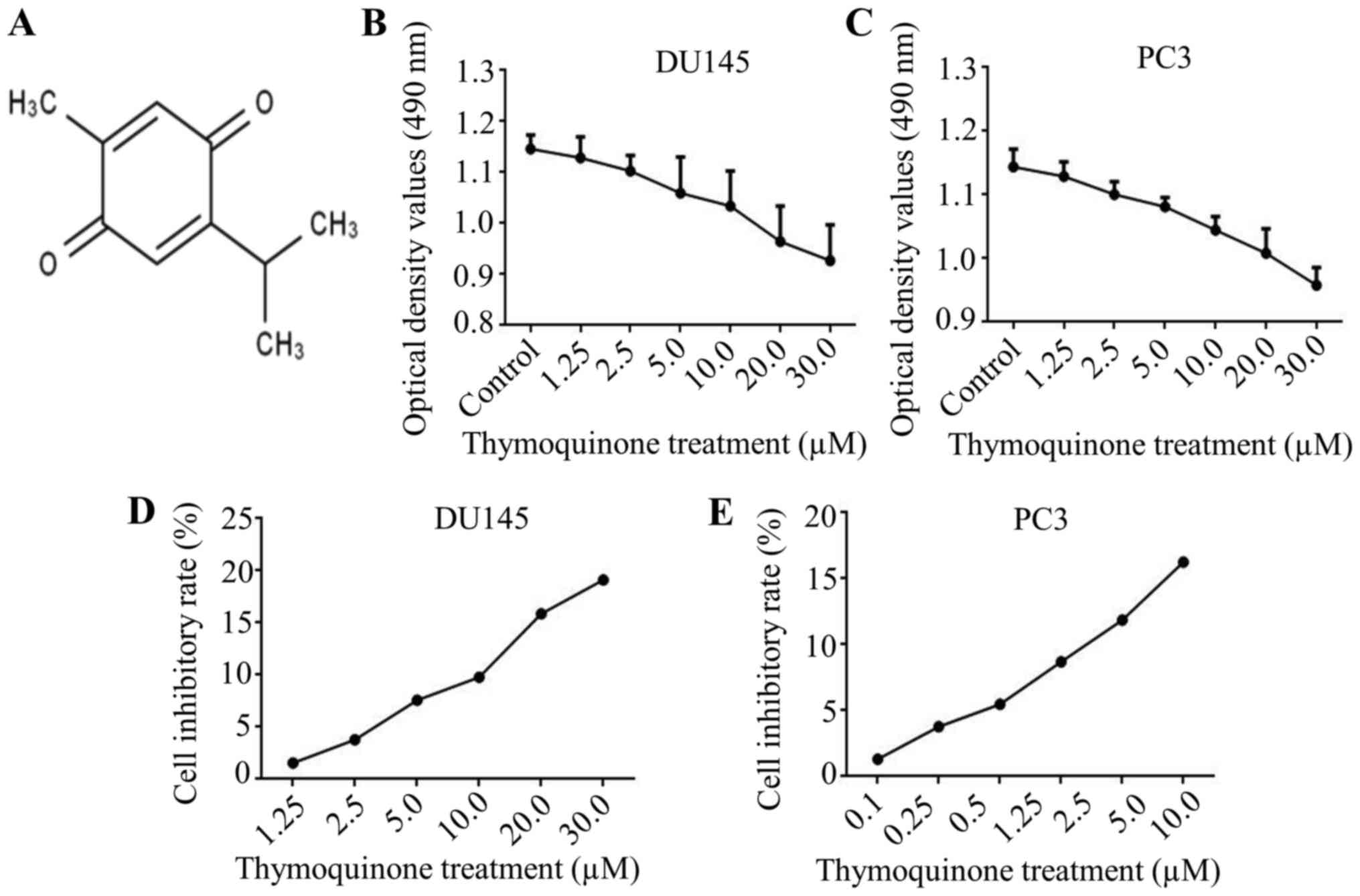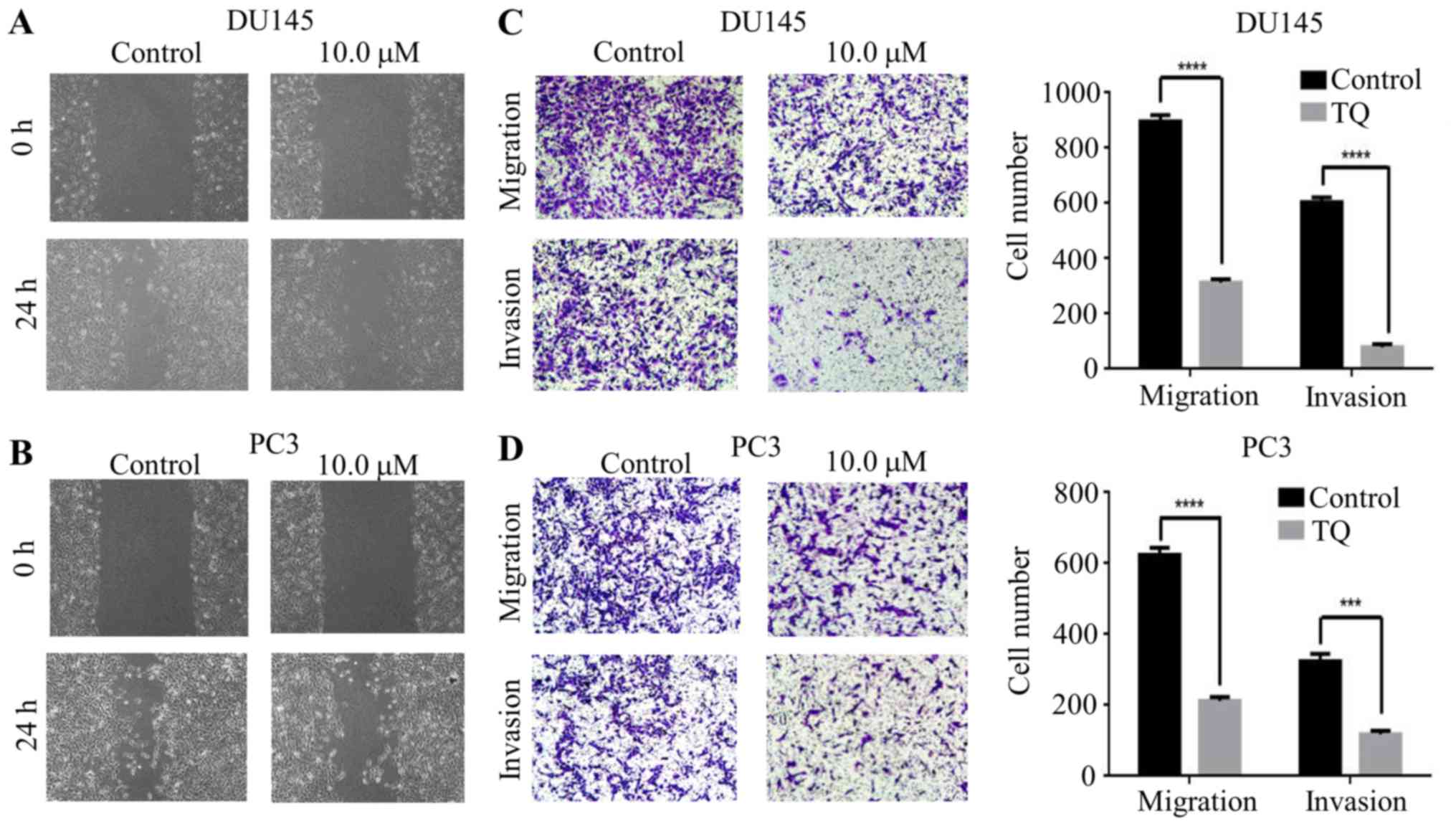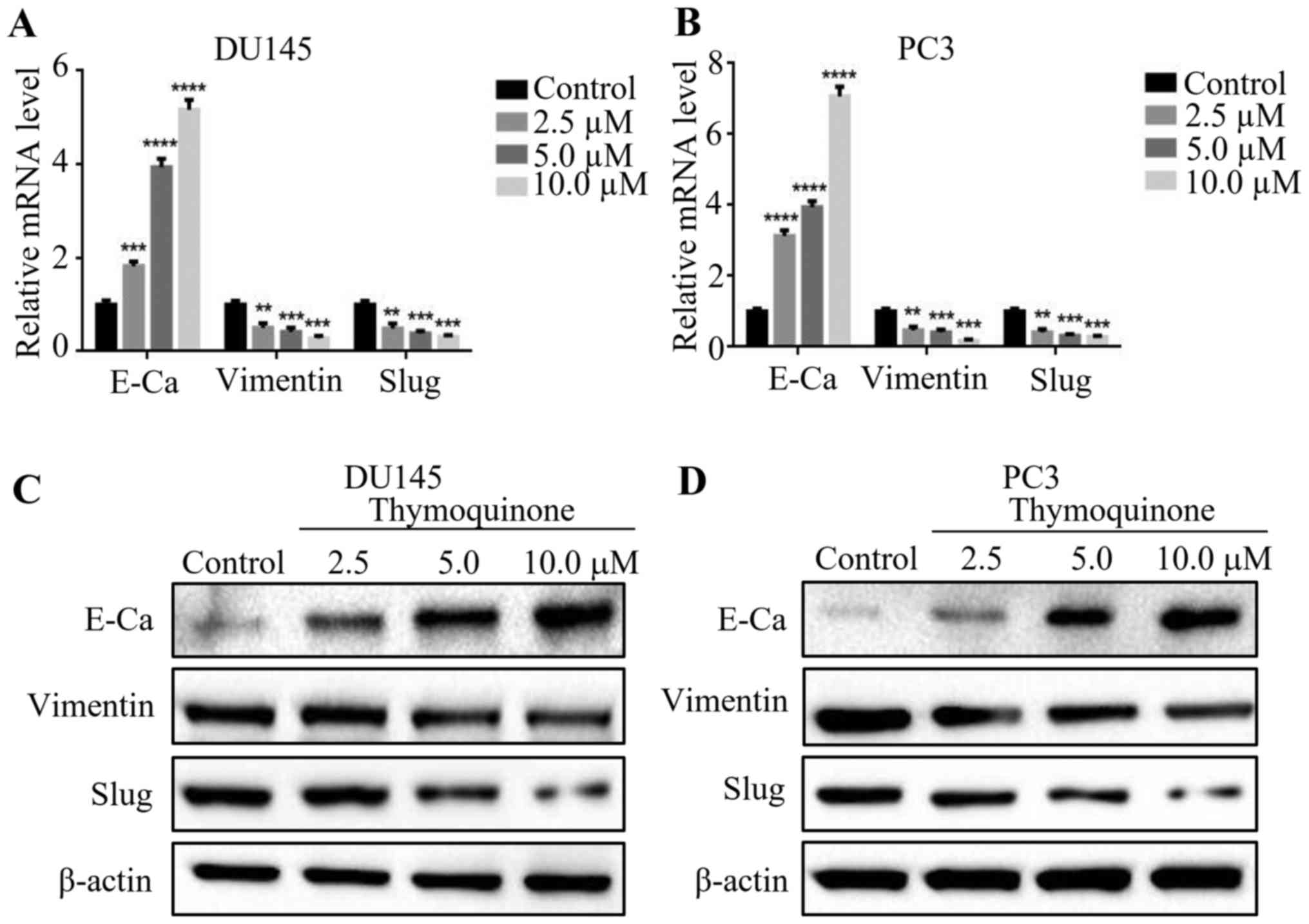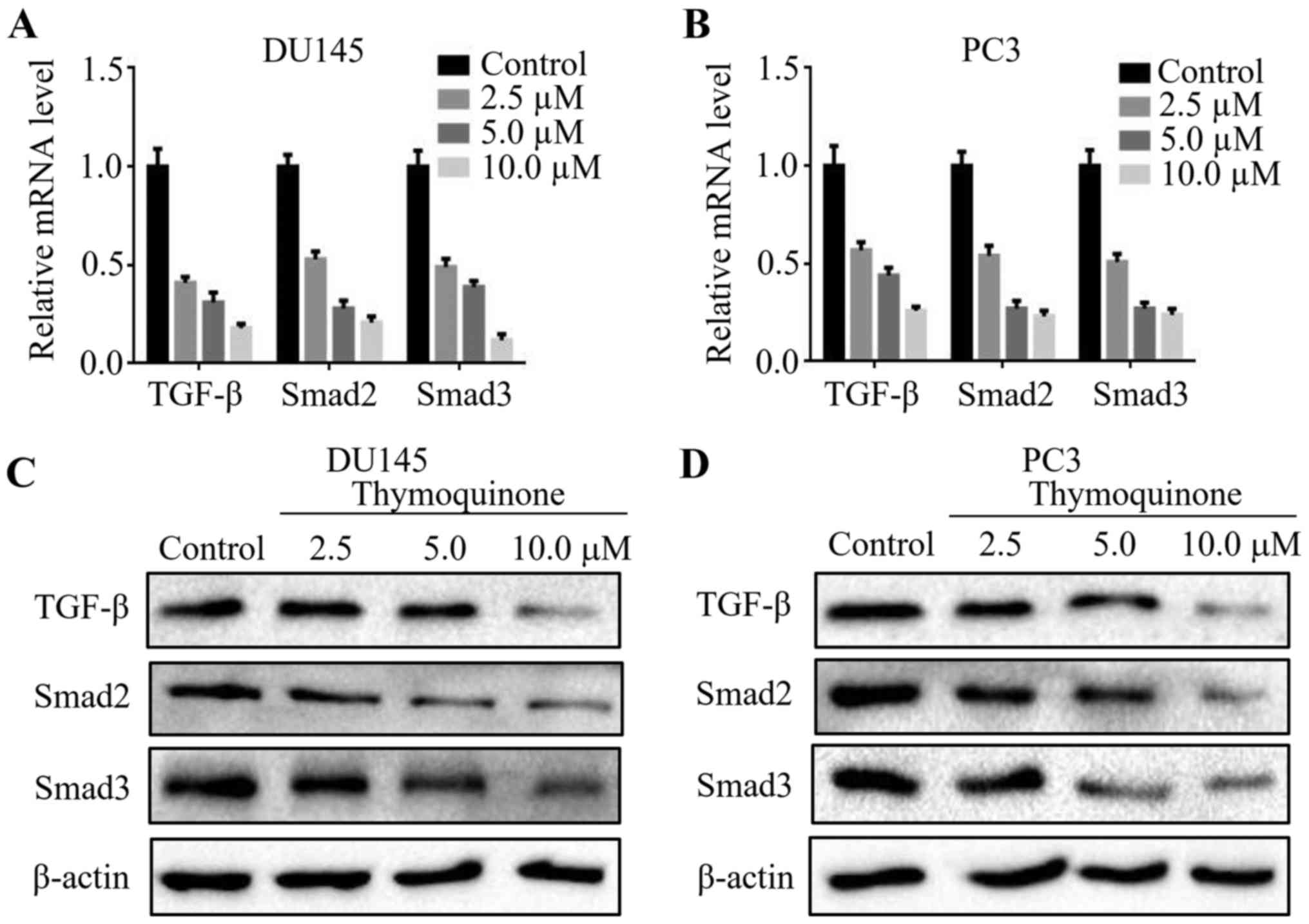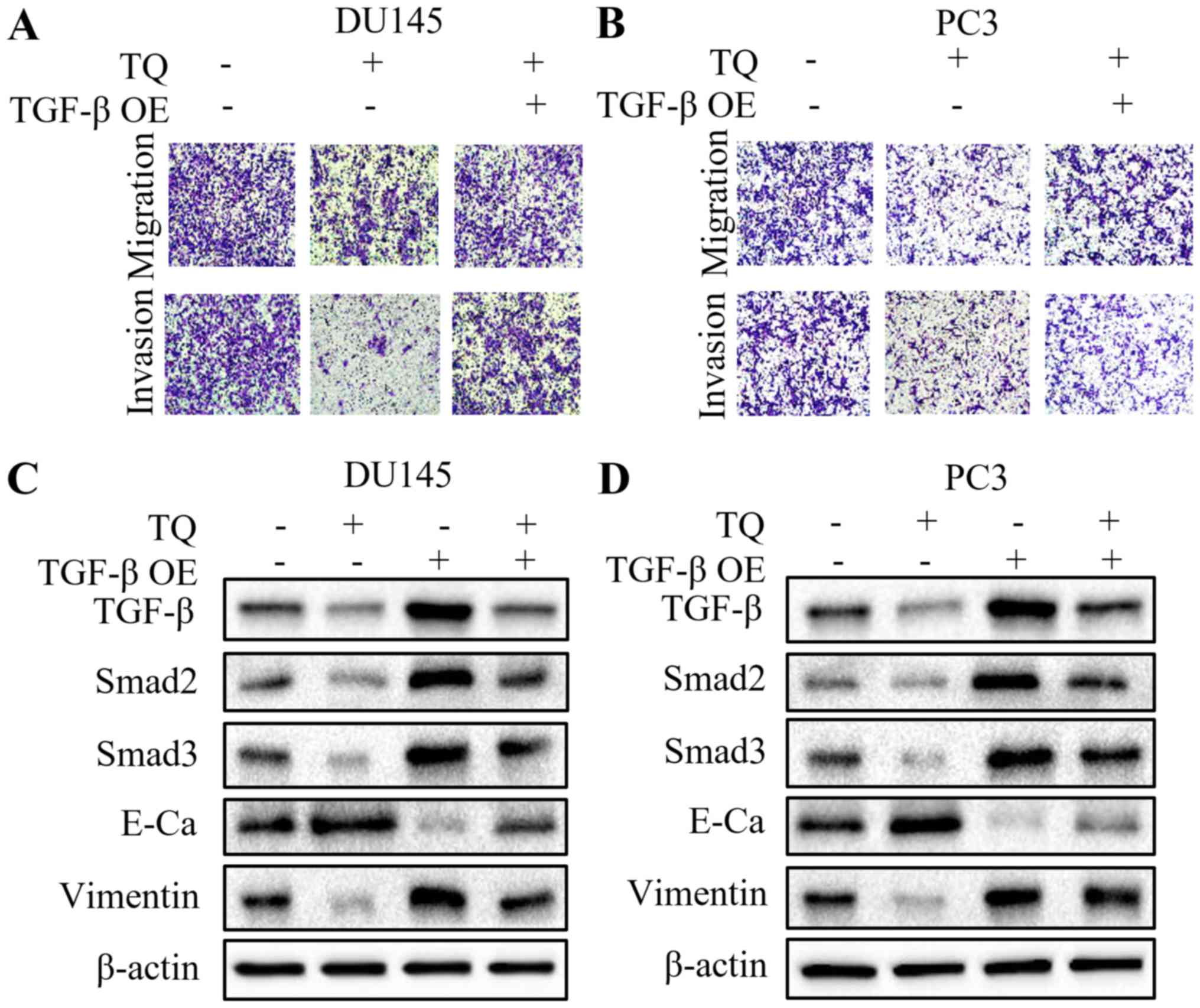|
1
|
Siegel RL, Miller KD and Jemal A: Cancer
Statistics, 2017. CA Cancer J Clin. 67:7–30. 2017. View Article : Google Scholar : PubMed/NCBI
|
|
2
|
Leyh-Bannurah SR, Gazdovich S, Budäus L,
Zaffuto E, Briganti A, Abdollah F, Montorsi F, Schiffmann J, Menon
M, Shariat SF, et al: Local therapy improves survival in metastatic
prostate cancer. Eur Urol. 72:118–124. 2017. View Article : Google Scholar : PubMed/NCBI
|
|
3
|
Mao XY, Li QQ, Gao YF, Zhou HH, Liu ZQ and
Jin WL: Gap junction as an intercellular glue: Emerging roles in
cancer EMT and metastasis. Cancer Lett. 381:133–137. 2016.
View Article : Google Scholar : PubMed/NCBI
|
|
4
|
Cha YH, Yook JI, Kim HS and Kim NH:
Catabolic metabolism during cancer EMT. Arch Pharm Res. 38:313–320.
2015. View Article : Google Scholar : PubMed/NCBI
|
|
5
|
Hossen MJ, Yang WS, Kim D, Aravinthan A,
Kim JH and Cho JY: Thymoquinone: An IRAK1 inhibitor with in vivo
and in vitro anti-inflammatory activities. Sci Rep. 7:429952017.
View Article : Google Scholar : PubMed/NCBI
|
|
6
|
Dur A, Kose H, Kocyigit A, Kocaman O,
Ismayilova M and Sonmez FC: The anti-inflammatory and antioxidant
effects of thymoquinone on ceruleine induced acute pancreatitis in
rats. Bratisl Lek Listy. 117:614–618. 2016.PubMed/NCBI
|
|
7
|
Relles D, Chipitsyna GI, Gong Q, Yeo CJ
and Arafat HA: Thymoquinone promotes pancreatic cancer cell death
and reduction of tumor size through combined inhibition of histone
deacetylation and induction of histone acetylation. Adv Prev Med.
2016:14078402016. View Article : Google Scholar : PubMed/NCBI
|
|
8
|
Acharya BR, Chatterjee A, Ganguli A,
Bhattacharya S and Chakrabarti G: Thymoquinone inhibits microtubule
polymerization by tubulin binding and causes mitotic arrest
following apoptosis in A549 cells. Biochimie. 97:78–91. 2014.
View Article : Google Scholar : PubMed/NCBI
|
|
9
|
Mohamed AM, Refaat BA, El-Shemi AG,
Kensara OA, Ahmad J and Idris S: Thymoquinone potentiates
chemoprotective effect of Vitamin D3 against colon cancer: A
pre-clinical finding. Am J Transl Res. 9:774–790. 2017.PubMed/NCBI
|
|
10
|
Salim LZ, Othman R, Abdulla MA, Al-Jashamy
K, Ali HM, Hassandarvish P, Dehghan F, Ibrahim MY, Omer FA and
Mohan S: Thymoquinone inhibits murine leukemia WEHI-3 cells in vivo
and in vitro. PLoS One. 9:e1153402014. View Article : Google Scholar : PubMed/NCBI
|
|
11
|
Xu D, Ma Y, Zhao B, Li S, Zhang Y, Pan S,
Wu Y, Wang J, Wang D, Pan H, et al: Thymoquinone induces G2/M
arrest, inactivates PI3K/Akt and nuclear factor-κB pathways in
human cholangiocarcinomas both in vitro and in vivo.
Oncol Rep. 31:2063–2070. 2014. View Article : Google Scholar : PubMed/NCBI
|
|
12
|
Zhang L, Bai Y and Yang Y: Thymoquinone
chemosensitizes colon cancer cells through inhibition of NF-κB.
Oncol Lett. 12:2840–2845. 2016. View Article : Google Scholar : PubMed/NCBI
|
|
13
|
Woo CC, Hsu A, Kumar AP, Sethi G and Tan
KH: Thymoquinone inhibits tumor growth and induces apoptosis in a
breast cancer xenograft mouse model: The role of p38 MAPK and ROS.
PLoS One. 8:e753562013. View Article : Google Scholar : PubMed/NCBI
|
|
14
|
Zhu WQ, Wang J, Guo XF, Liu Z and Dong WG:
Thymoquinone inhibits proliferation in gastric cancer via the STAT3
pathway in vivo and in vitro. World J Gastroenterol. 22:4149–4159.
2016. View Article : Google Scholar : PubMed/NCBI
|
|
15
|
Koka PS, Mondal D, Schultz M, Abdel-Mageed
AB and Agrawal KC: Studies on molecular mechanisms of growth
inhibitory effects of thymoquinone against prostate cancer cells:
Role of reactive oxygen species. Exp Biol Med. 235:751–760. 2010.
View Article : Google Scholar
|
|
16
|
Chen W, Zhou S, Mao L, Zhang H, Sun D,
Zhang J, Li J and Tang JH: Crosstalk between TGF-β signaling and
miRNAs in breast cancer metastasis. Tumour Biol. 37:10011–10019.
2016. View Article : Google Scholar : PubMed/NCBI
|
|
17
|
Yi T, Cho SG, Yi Z, Pang X, Rodriguez M,
Wang Y, Sethi G, Aggarwal BB and Liu M: Thymoquinone inhibits tumor
angiogenesis and tumor growth through suppressing AKT and
extracellular signal-regulated kinase signaling pathways. Mol
Cancer Ther. 7:1789–1796. 2008. View Article : Google Scholar : PubMed/NCBI
|
|
18
|
Kaseb AO, Chinnakannu K, Chen D,
Sivanandam A, Tejwani S, Menon M, Dou QP and Reddy GP: Androgen
receptor and E2F-1 targeted thymoquinone therapy for
hormone-refractory prostate cancer. Cancer Res. 67:7782–7788. 2007.
View Article : Google Scholar : PubMed/NCBI
|
|
19
|
Dirican A, Erten C, Atmaca H, Bozkurt E,
Kucukzeybek Y, Varol U, Tarhan Oktay M, Karaca B and Uslu R:
Enhanced cytotoxicity and apoptosis by thymoquinone in combination
with zoledronic acid in hormone-and drug-resistant prostate cancer
cell lines. J BUON. 19:1055–1061. 2014.PubMed/NCBI
|
|
20
|
Iskender B, Izgi K, Hizar E, Jauch J,
Arslanhan A, Yuksek EH and Canatan H: Inhibition of
epithelial-mesenchymal transition in bladder cancer cells via
modulation of mTOR signalling. Tumour Biol. 37:8281–8291. 2016.
View Article : Google Scholar : PubMed/NCBI
|
|
21
|
Zhou Q, Zheng X, Chen L, Xu B, Yang X,
Jiang J and Wu C: Smad2/3/4 pathway contributes to TGF-β-induced
miRNA-181b expression to promote gastric cancer metastasis by
targeting Timp3. Cell Physiol Biochem. 39:453–466. 2016. View Article : Google Scholar : PubMed/NCBI
|
|
22
|
Zimmerman KA, Xing D, Pallero MA, Lu A,
Ikawa M, Black L, Hoyt KL, Kabarowski JH, Michalak M and
Murphy-Ullrich JE: Calreticulin regulates neointima formation and
collagen deposition following carotid artery ligation. J Vasc Res.
52:306–320. 2015. View Article : Google Scholar : PubMed/NCBI
|
|
23
|
Ren X, Bo Y, Fan J, Chen M, Xu D, Dong Y,
He H, Ren X, Qu R, Jin Y, et al: Dalbergioidin ameliorates
doxorubicin-induced renal fibrosis by suppressing the TGF-β signal
pathway. Mediators Inflamm. 2016:51475712016. View Article : Google Scholar : PubMed/NCBI
|
|
24
|
Tennant BR, Chen J, Shih AZ, Luciani DS
and Hoffman BG: Myt3 mediates laminin-V/integrin-β1-induced
Islet-cell migration via Tgfbi. Mol Endocrinol.
29:1254–1268. 2015. View Article : Google Scholar : PubMed/NCBI
|
|
25
|
Zhao J, Cheng Q, Ye P, Yang G, Liu S, Ao
Q, Liu Y and Hu Y: Atorvastatin improves pathological changes in
the aged kidney by upregulating peroxisome proliferator-activated
receptor expression and reducing matrix metalloproteinase-9 and
transforming growth factor-β1 levels. Exp Gerontol. 74:37–42. 2016.
View Article : Google Scholar : PubMed/NCBI
|
|
26
|
Zhang L, Cheng X, Gao Y, Zhang C, Bao J,
Guan H, Yu H, Lu R, Xu Q and Sun Y: Curcumin inhibits metastasis in
human papillary thyroid carcinoma BCPAP cells via down-regulation
of the TGF-β/Smad2/3 signaling pathway. Exp Cell Res. 341:157–165.
2016. View Article : Google Scholar : PubMed/NCBI
|
|
27
|
Ouanouki A, Lamy S and Annabi B:
Anthocyanidins inhibit epithelial-mesenchymal transition through a
TGFβ/Smad2 signaling pathway in glioblastoma cells. Mol Carcinog.
56:1088–1099. 2017. View
Article : Google Scholar : PubMed/NCBI
|















